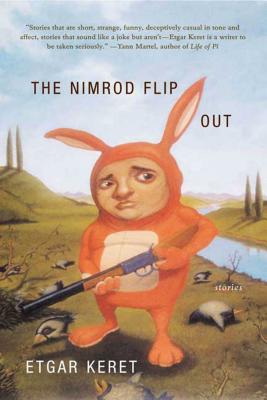
I finally read a book that cured my case of the blahs. Unfortunately that's because I really didn't enjoy it. It's an awfully slim book--about 160 pages--and yet it includes thirty separate stories. And they all start to seem awfully similar pretty rapidly. The names are different, and the details of the story are different, but really, underneath the frippery, they're the same: anxiety-ridden, jittery, relentlessly modern. The characters are glib and disconnected, the storytelling truncated. And, with the exception of the sameness, there's not really anything wrong with those things. It's a sort of fiction that's not really to my taste, but I think it's good that someone's writing it and I think it engages with the present day in a different way than a lot of the fiction I like best.
At first I thought maybe it was the length, or lack there of, that was giving me a problem. That the stories didn't have a chance to develop properly. But the longer stories--and "longer" is relative here--get tedious quickly. Maybe it's the prose that throws me. It's not a prose style I'm particularly fond of and that probably contributes to my boredom. I'm reading this in translation and speak no Hebrew whatsoever so it's hard to know where exactly the problem lies for me. But nevertheless, the stories have a very distinctive (and consistent) tone.
One story, "Glittery Eyes," starts:
This is the story of a little girl who loved glittery things more than anything else in the whole world. She had a glittery dress, and glittery socks, and glittery ballet slippers. And a glittery black doll named Christy after their maid. Even her teeth glittered, though her father insisted that they sparkled, which wasn't quite the same.
In the story the little girl wants glittery eyes to go with her glittery dress, and her glittery teeth, etc. But she can't have them. Another story, "A Thought in the Shape of a Story" features a similar theme, and that one begins like so:
This is a story about people who once lived on the moon. Nowadays, there's no one up there, but up until just a few years ago, the place was mobbed. The people on the moon thought they were very special, because they could think their thoughts in any shape they wanted. In the shape of a pot, or a table, or even in the shape of flared pants. [. . .] It was all very impressive, all those shaped thoughts, except that as time passed, all the people on the moon came to a kind of agreement about how every thought should look.
There's a man on the moon and he wants to think his thoughts into different shapes. But he doesn't get what he wants. Both stories are about three pages long. They're not next to each other in the book, and are separated by a good number of stories, but they're close enough that you can easily read them in one sitting and they're not the only two such stories in the book anyway. Individually, I don't dislike the stories. In fact I find the ending of the one about the people on the moon oddly, beautifully sad. they're not really as interesting in combination as they are on their own merits.
I think that's what was particularly frustrating about this book for me. Keret has something to say and the skills to say it. But actually sitting down and reading my way through The Nimrod Flipout made me want to toss it out the window. Perhaps it's a book I would have been better off dipping in and out of rather than reading straight through . . .


